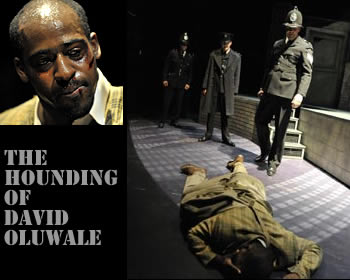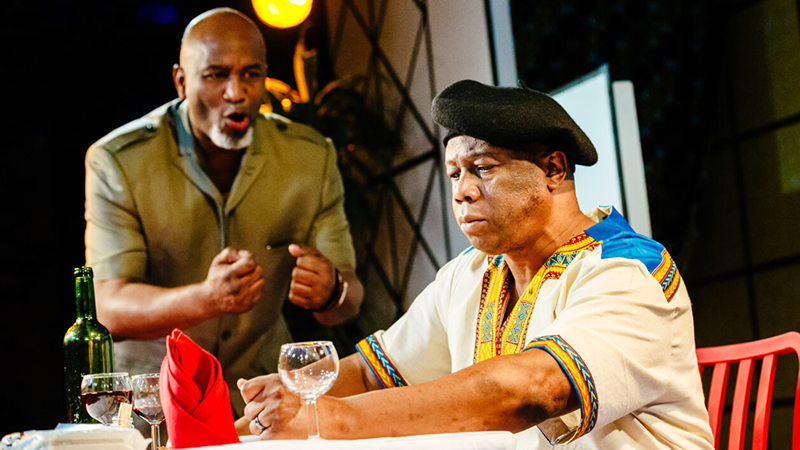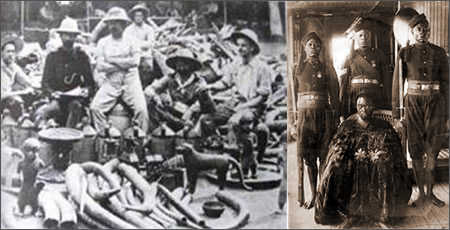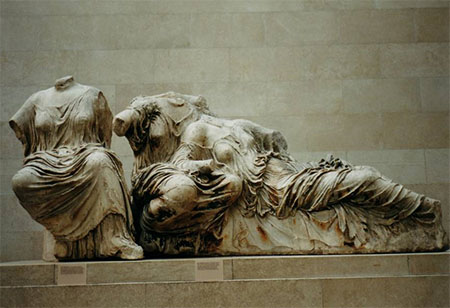I’ve just came back from watching the superb play, The Hounding of David Oluwale based on the book by Kesper Aspden and I still find it difficult to talk let alone write about it. I’m not sure whether it’s because I feel uncomfortable about not knowing much about this tragic but important piece of history or am just angry that many of the issues that occurred several decades ago leading to the murder of an innocent man are still current issues affecting the descendants of African immigrants living in Britain today.

David Oluwale played by Daniel Francis was an African who in 1949 came to UK from Nigeria with hopes of realising a dream in the heart of empire. Mis-educated to believe Britain was a civilised nation with opportunity for all, he planned to train as an engineer and return home to help his family and people.
Tragic circumstances prevented this and on 4 May 1969 his body was found in the River Aire at Knostrop in Leeds. The two Leeds police officers, Geoff Ellerker and Ken Kitching who continuously harassed, beat and eventually murdered him were found guilty of causing him physical harm but on directions from the judge acquitted of manslaughter. Unsurprisingly, for a British court, David Oluwale was repeatedly likened to a wild animal, during the November 1971 trial. This remains a racist stereotype that has plagued investigations into the deaths of African people in the UK ever since.
Yet whilst this play is hung around the premise of revealing the horrific details from the investigation into David Oluwale’s death, it simultaneously achieves the remarkable feat of telling us about David Oluwale the man, the person, the human. We may not even be sure about Oluwale being his real name, but his life in unquestionable.
Oladipo Agboluaje’s masterful adaptation for the stage not only brings much passion to the topic but also restraint and subtlety, tactically avoiding the use of ‘burn babylon’ clichés to allow actor Daniel Francis, to powerfully illustrate the path from hopeful immigrant to that of a man unfairly locked up for eights years in the Menston ‘mental’ asylum, during which time he was subjected to electro-therapy treatment and heavy antipsychotic tranquillisers.
Dipo Agboluaje ensures his harrowing descent after being released back onto the streets and being made jobless, homeless and eventually brutalised by a imperialist social system built on raw anti-African ideology is both compelling although very painful to watch. However this is not a tale about police barbarity, nor is it a play about racism.
It would have been easy, almost lazy to simply focus on reminding people that since David Oluwale’s case not a single police officer has ever been successfully prosecuted for murder even when inquests have returned verdicts of ‘unlawful killings’. From Frank Ogboru to Christopher Alder, from Rocky Bennet to Sean Bell, despite the impotence of the Macpherson report following the bungling of Stephen Lawrence’s murder there has been little progress on this matter. No lessons learnt.
But playwright Dipo skilfully avoids the moralising and sticks to the task at hand. In so doing he addresses the police hounding whilst crafting a play about hope and dreams, a play about dignity and the human desire for love, security and justice. A play about the life of 38 year old, David Oluwale, an African. Get to know him.
David Oluwale Memorial Appeal,
c/o Max Farrar,
Macauley 106,
Leeds Metropolitan University,
Headingley Campus,
Leeds, LS6 3QS
m.farrar@leedsmet.ac.uk
0113 812 3984

External Links
BMHUK: The Hounding of David Oluwale play brings injustices of deaths in custody to the stageDavid Oluwale Memorial Appeal

Daniel Francis acts in The Hounding of David Oluwale, a play by Oladipo Agboluaje
Tragic circumstances prevented this and on 4 May 1969 his body was found in the River Aire at Knostrop in Leeds. The two Leeds police officers, Geoff Ellerker and Ken Kitching who continuously harassed, beat and eventually murdered him were found guilty of causing him physical harm but on directions from the judge acquitted of manslaughter. Unsurprisingly, for a British court, David Oluwale was repeatedly likened to a wild animal, during the November 1971 trial. This remains a racist stereotype that has plagued investigations into the deaths of African people in the UK ever since.
Yet whilst this play is hung around the premise of revealing the horrific details from the investigation into David Oluwale’s death, it simultaneously achieves the remarkable feat of telling us about David Oluwale the man, the person, the human. We may not even be sure about Oluwale being his real name, but his life in unquestionable.
Oladipo Agboluaje’s masterful adaptation for the stage not only brings much passion to the topic but also restraint and subtlety, tactically avoiding the use of ‘burn babylon’ clichés to allow actor Daniel Francis, to powerfully illustrate the path from hopeful immigrant to that of a man unfairly locked up for eights years in the Menston ‘mental’ asylum, during which time he was subjected to electro-therapy treatment and heavy antipsychotic tranquillisers.
Dipo Agboluaje ensures his harrowing descent after being released back onto the streets and being made jobless, homeless and eventually brutalised by a imperialist social system built on raw anti-African ideology is both compelling although very painful to watch. However this is not a tale about police barbarity, nor is it a play about racism.
It would have been easy, almost lazy to simply focus on reminding people that since David Oluwale’s case not a single police officer has ever been successfully prosecuted for murder even when inquests have returned verdicts of ‘unlawful killings’. From Frank Ogboru to Christopher Alder, from Rocky Bennet to Sean Bell, despite the impotence of the Macpherson report following the bungling of Stephen Lawrence’s murder there has been little progress on this matter. No lessons learnt.
But playwright Dipo skilfully avoids the moralising and sticks to the task at hand. In so doing he addresses the police hounding whilst crafting a play about hope and dreams, a play about dignity and the human desire for love, security and justice. A play about the life of 38 year old, David Oluwale, an African. Get to know him.
David Oluwale Memorial Appeal,
c/o Max Farrar,
Macauley 106,
Leeds Metropolitan University,
Headingley Campus,
Leeds, LS6 3QS
m.farrar@leedsmet.ac.uk
0113 812 3984

External Links
BMHUK: The Hounding of David Oluwale play brings injustices of deaths in custody to the stageDavid Oluwale Memorial Appeal
Ligali is not responsible for the content of third party sites





Get involved and help change our world